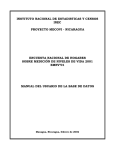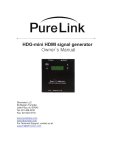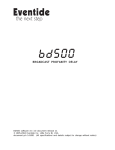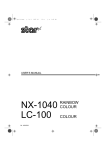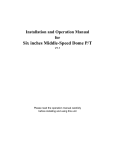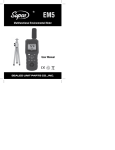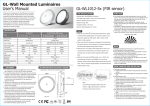Download Operating Instructions
Transcript
Operating Instructions LVC-S60 Before installing and using the camera, please read these instructions thoroughly and retain them for later reference. CAUTION RISK OF ELECTRIC SHOCK DO NOT OPEN Warning To prevent fire or shock hazard, do not expose the unit to rain or moisture. To avoid electrical shock, do not open the cabinet Refer servicing to qualified personnel only. CAUTION TO REDUCE THE RISK OF ELECTRIC SHOCK, DO NOT REMOVE COVER (OR BACK). NO USER SERVICEABLE PARTS INSIDE, REFER SERVICING TO QUALIFIED SERVICE PERSONNEL. This symbol is intended to alert the user to the presence of uninsulated “dangerous voltage” within the product’s enclosure that may be of sufficient magnitude to constitute a risk of electric shock to persons. This symbol is intended to alert the user to the presence of important operating and maintenance (servicing) instructions in the literature accompanying the appliance. 2 Regulatory Notices For U.S.A This equipment has been tested and found to comply with the limits for a Class A digital device, pursuant to Part 15 of the FCC Rules. These limits are designed to provide reasonable protection against harmful interference in a residential installation! This equipment generates, uses and can radiate radio frequency energy and, if not installed and used in accordance with the instructions, may cause harmful interference to radio communications. However, there is no guarantee that interference will not occur in a particular installation. If this equipment does cause harmful interference to radio or television reception, which can be determined by turning the equipment off and on, the user is encouraged to try to correct the interference by one or more of the following measures: • Reorient or relocate the receiving antenna. • Increase the separation between the equipment and receiver. • Connect the equipment into an outlet on a circuit different from that to which the receiver is connected. • Consult the dealer or an experienced radio/TV technician for help. This Class A digital apparatus meets all requirements of the Canadian Interference-Causing Equipment Regulations. This product is manufactured to comply with the radio interference requirements of EEC DIRECTIVE 89/336/EEC, 93/68/EEC and 73/23/EEC. Contents Features ..................................................................................................................................3 Cautions for Safe Operation ......................................................................................................4 Operating Controls and Their Functions ..............................................................................5-6 Connections .........................................................................................................................7-8 Back Focus Adjustment ..........................................................................................................9 Installation of Camera............................................................................................................10 Specifications.........................................................................................................................11 FEATURES This color video camera is designed for use in monitoring system. • High resolution and high sensitivity with a 1/3 inch Super HAD CCD (Charge Coupled Device) • Line Lock when using AC24V power. • CS Mount • Dual power AC 24V / DC 12V • Non-polarity DC12V Maintence of the unit • Remove dust or dirt on the surface of the lens with a blower. • Use a dry soft cloth to clean the body. If it is very dirty, use a cloth dampended with a small quantity of neutral detergent and then wipe dry. • Avoid the use of volatile solvents such as thinners, alcohol, benzene, and insecticides. They may damage the surface of the body. 3 Cautions for Safe Operation Power Supply They must be operated with a AC 24V class 2 power supply and DC12V alternatively. * Notes: Be careful of AC frequency when the camera is operated with Line lock mode. AC24V(60Hz):S60HM/S60NM AC24V(50Hz):S60HP/S60NP Handling of the unit Be careful not to spill water or other liquids on the unit. Be cautions not to get combustible or metallic material inside the body. If used with foreign matter inside, the camera is liable to fail or to get a cause of fire or electric shock. 4 Operating and storage location Avoid viewing a very bright object (such as light fittings) during an extended period. Avoid operating or storing the unit in the following locations. • Extremely hot or cold places (operating temperature -10oC~50oC, however, we recommend that the unit be used within a temperature range of 0oC~45oC) • Damp or dust place • Places exposed to rain • Places subject to strong vibration • Close to generators of powerful electromagnetic radiation such as radio or TV transmitters. OPERATING CONTROLS AND THEIR FUNCTIONS DC 12V VIDEO OUT AES VIDEO DC IRIS POWER PHASE AC 24V~ 1 7 1 2 3 4 5 6 4 3 2 9 5 6 8 CLASS 2 ONLY 10 12 11 Pin assignment of auto iris lens connector 3 4 1 2 Tripod adapter CCD cover Dip switches Line phase adjustment volume Lens selection switch DC iris level adjustment volume Pin No. 1 2 3 4 DC iris Damping Damping + Drive + Drive - Video iris Vcc + Not used Video Ground 7 Back focus lock screw 8 Auto iris lens connector 9 Back focus adjustment screw 0 Power LED qa BNC connector for video output qs Power input connector 5 OPERATING CONTROLS AND THEIR FUNCTIONS ➀ ② The Adjustment method of Line Lock Phase When using a camera switcher to connect 2 cameras or more to one monitor, there may be a vertical roll of the images when switched. In such a case, refer to the below. -The vertical sync phase can be manually adjusted within the range approximately from -90o to +90o. - Switch the display on the monitor from camera1 to camera2. Adjust the PHASE volume on camera2 until the vertical roll of the image stops. If more than two cameras are used, please repeat this procedure for all the cameras. - If you can’t adjust vertical sync. phase, Please exchange the polarity of input terminal. ➀ Camera switcher ② Monitor ➂ Vertical phase ➂ 6 CONNECTIONS DC 12V DC12V Power Connection LVC-S60 (DC12V/AC24V Compatible) 1. DC 12V Power Supply Remove the insulation on the power cable as illustrated and connect the power cord to the AC/DC compatible terminals on rear panel of the camera. Note : You don't need to be cautious of the polarity of positive and negative. (Auto polarity sensing) 2. AC 24V Power Supply Connect the power cable to the AC/DC compatible input terminal on the rear panel of the camera AC24V Note : To get the optimum performance from the unit, be sure to connect to an AC supply of 24V ±10% AC 24V~ 1 2 Connecting the monitor ➀ To VIDEO OUT ② To video input on the monitor 7 Lens Mounting Remove the CCD cover. Then attach the CS mount lens to the camera. Please refer to the drawing on the left. CAUTION Be cautious not to use Auto Iris Lens with over 75mA DC iris level is preset in the factory. Only if necessary, adjust the DC iris level to achieve the proper picture with AGC off. VIDEO AES DC Auto Iris Mode Selection POSITION DC AES VIDEO * Factory Setting 8 LENS DC iris lens Manual or fixed iris lens Video iris lens No. NAME 1 Synchronization mode (SYNC) 2 Back light compensation (BLC) 3 Auto gain control (AGC) 4 Flickerless (FL) 5 White Balance (WB) POSITION L.L. INT. ON OFF ON OFF ON OFF HOLD ATW Set the auto iris mode selection switch to the position that corresponds to the lens which is mounted to the camera. Please refer to the table on the left. FUNCTION Line lock mode Internal synchronization mode sets to this position when strong light comes in behind the target normal position AGC level varies from 10dB to maximum 30dB 10dB (Max.) shutter speed is fixed. (NTSC : 1/100 sec, PAL : 1/120 sec) shutter speed is not fixed. WB is fixed tracks and adjusts WB automatically BACK FOCUS ADJUSTMENT If back focus has to be adjusted after mounting the lens, 1. Loosen the back focus lock screw(1) on top of the camera with a (+) screwdriver 2. Turn the back focus adjustment screw(2) on top of the camera with hands until the desired focus is reached. 3. Tighten the back focus lock screw(1). Note : When tighten screw, do not inflict unreasonable force. It may damage to the unit. (1) (2) 9 INSTALLATION OF CAMERA This camera is mounted with tripod which makes it possible to install from both of the bottom and the top of the unit as illustrated. 10 Specification Model Signal System Total/Effective Pixels Pick-Up Device Lens Iris Control Signal Process Scanning System Sync. System Scanning Frequency Resolution S/N Ratio Standard Illuminance Sensitivity (1/3 Output) Video Output Signal Back Light Gain Control Flickerless White Balance Exposure Power Source Power Consumption Operation Temp. Storage Temp. Weight Dimensions LVC-S60HM LVC-S60HP LVC-S60NM LVC-S60NP NTSC 410K/380K PAL NTSC PAL 470K/440K 270K/250K 320K/290K 1/3 - Inch Interline Color CCD(Super HAD) CS MOUNT DC / AES / VIDEO Digital Signal Process 2:1 Interlace Internal / External (Line Lock) Internal 59.94Hz(VD) 50Hz(VD) 59.94Hz(VD) 50Hz(VD) More than 480Line(H) More than 470Line(H) More than 330Line(H) More than 320Line(H) More than 50 dB 2000Lux (5100°K) 0.4Lux (F1.0) 0.1Lux (F1.0) 1Vp-p Composite (75Ω) Manual ON / OFF (with DIP Switch) ON (Max. 30dB) / OFF (Max.10dB) (with DIP Switch) ON / OFF (with DIP Switch) ATW / HOLD (with DIP Switch) Automatic control with DC Iris meter / Video Iris meter / Auto Electronic Shutter (Max. 1/100000) DC 12V ± 10% (Auto Polarity Sensing) / AC 24V ± 10% 2.8W 2.0W -10oC ~ 50 oC (Humidity : 0%RH ~ 60%RH) -20 oC ~ 60 oC (Humidity : 0%RH ~ 85%RH) Approximately 300g 55 (H) X 56 (V) X 123 (D) 11 P/NO.: 3834RS0068M















